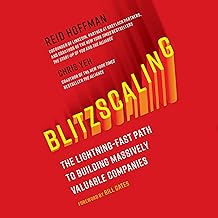
The Bogleheads' Guide to Investing
Mel Lindauer , Taylor Larimore , et al.
4.7 on Amazon
11 HN comments

Who
Geoff Smart and Randy Street
4.5 on Amazon
11 HN comments

The Lean Product Playbook: How to Innovate with Minimum Viable Products and Rapid Customer Feedback
Dan Olsen
4.7 on Amazon
10 HN comments

Tribal Leadership: Leveraging Natural Groups to Build a Thriving Organization
Dave Logan , John King, et al.
4.6 on Amazon
10 HN comments

The Big Picture: How to Use Data Visualization to Make Better Decisions―Faster
Steve Wexler
5 on Amazon
10 HN comments

New Sales. Simplified.: The Essential Handbook for Prospecting and New Business Development
Mike Weinberg
4.7 on Amazon
9 HN comments

The Outsiders: Eight Unconventional CEOs and Their Radically Rational Blueprint for Success
William N. Thorndike
4.6 on Amazon
9 HN comments

Sprint: How to Solve Big Problems and Test New Ideas in Just Five Days
Jake Knapp
4.7 on Amazon
9 HN comments

The Making of a Manager: What to Do When Everyone Looks to You
Julie Zhuo
4.6 on Amazon
8 HN comments

The Psychology of Money: Timeless Lessons on Wealth, Greed, and Happiness
Morgan Housel, Chris Hill, et al.
4.7 on Amazon
8 HN comments

TED Talks: The Official TED Guide to Public Speaking
Chris Anderson
4.6 on Amazon
7 HN comments

Beating the Street
Peter Lynch and John Rothchild
4.6 on Amazon
7 HN comments

Red Notice: A True Story of High Finance, Murder, and One Man's Fight for Justice
Bill Browder
4.8 on Amazon
7 HN comments

Blitzscaling: The Lightning-Fast Path to Building Massively Valuable Companies
Reid Hoffman, Chris Yeh, et al.
4.5 on Amazon
7 HN comments

Getting Past No: Negotiating in Difficult Situations
William Ury
4.6 on Amazon
7 HN comments
diegoonApr 23, 2012
charfordonApr 9, 2015
Next up, The Lean Startup.
zmitrionJan 10, 2011
Programming Collective Intelligence by Toby Segaran
Tribal Leadership: Leveraging Natural Groups to Build a Thriving Organization by Dave Logan, John King, Halee Fischer-Wright
Robin_MessageonJan 9, 2016
Their model has 5 stages. Stage 1 is 'life sucks' and stage 2 is 'my life sucks'. What you describe fits between those stages. Their ideas about stages beyond that are pretty interesting.
ada1981onOct 9, 2020
thornkinonFeb 18, 2014
drallisononApr 12, 2018
by Dave Logan, John King, and Halee Fischer-Wright worth the read.
My point--there is not much real quantitative science in this area: just stories and cautionary tales.
treenyconDec 10, 2013
hard vs easy
good vs bad
moral vs immoral
can sometimes be over simplifying due to the normative nature of these concepts.
For someone who knows Vietnamese to learn Chinese is easy, but for someone who only knows English learning Chinese can be harder.
Each discipline has its' own linguistic domain. The difference between a software programmer and a rocket scientist is the rocket scientist knows a set of specific terms/vocabulary that distinguishes different parts of rocket, fuel, working process of aerospace and other stuff I don't know anything about. Not only does the rocket scientist knows all the terms, he/she also understands the relationship between each terms. It is mastery of this Linguistic Domain that make it possible for rocket scientists.
Programmer has mastery of a different Linguistic Domain and for some rocket scientists it may seem hard.
I do some what agree with you on the 'insecurity thing'. Although I think that is only a case in below stage 4 working culture (see Dave Logan, Tribal Leadership for reference on organizational culture stages http://www.ted.com/talks/david_logan_on_tribal_leadership.ht...).
diegoonDec 27, 2011
* Steve Jobs, by Walter Isaacson
* Slack, by Tom DeMarco (also re-read Peopleware). Both of these books are fundamental to anyone developing software within an organization.
* Delivering Happiness, by Tony Hsieh. It's not fantastic but it's helpful if you are trying to build a business.
* Tribal Leadership - recommended by the above. Not great but interesting.
* Rework - short read, worth the time.
* Managing Humans by Rands - very entertaining, useful if you manage people.
Other stuff I read is not worth mentioning in a "best books" list.
treenyconDec 27, 2013
If you read
The Oil Card: Global Economic Warfare in the 21st Century
Jim Norman
http://www.amazon.com/The-Oil-Card-Economic-Warfare/dp/09777...
A high oil price checkmates China (with its large population) but puts money in Putin’s coffers. Going back to the cold war one will see the fall of Soviet Union is engineered by suppression of Oil Prices during the cold war. After 1989 the Soviet reexamine, they agrees that it is cheap oil price that checkmated them.
The trick now has a lot to do with strategy and game theory. I find that to be a bit depressing. As Dave Logan who wrote Tribal Leadership says:
"Culture eats strategy for breakfast."
It would be nice to see the countries foster a kind of culture that will generate wealth for all, instead of devising game theory and strategy to out compete each other or different corporate factions.
Healthy competition is a great instrument on small individual scale, it is idiosyncratic/inefficient on the country scale.